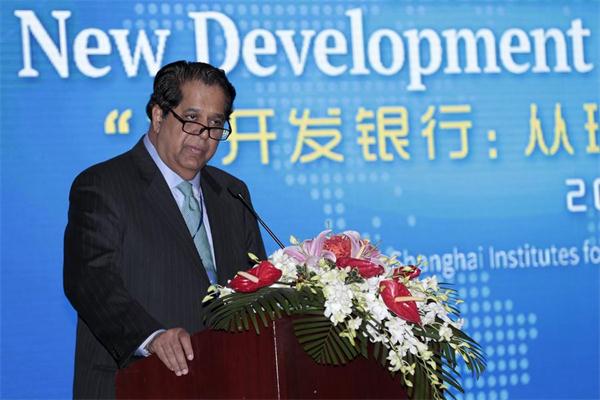 |
|
President of the New Development Bank (NDB) Kundapur Vaman Kamath gives a speech during a opening ceremony of the New Development Bank in Shanghai, China, July 21, 2015. Officials from the world's largest emerging nations launched the New Development Bank (NDB) on Tuesday, the second of two new policy banks heavily backed by Beijing that are being pitched as alternatives to existing institutions such as the World Bank. [Photo/Agencies] |
BRICS leaders recently formalized the newest global bank, New Development Bank, which will use its $100-billion initial capital to fund infrastructure and sustainable development projects in member states as well as other countries.
The NDB will not only bind them together in a common purpose but will also introduce something not seen since the dawn of multilateralism: competition to the Western-dominated international financial system.
Despite the best intentions of many working at the World Bank and the International Monetary Fund, the existing international financial institutions have consistently fallen short of their aim to provide development assistance for the most marginalized countries. With their often-problematic loan conditions, they have at times impeded rather than promoted equal development. The NDB could change that. As a bank created in and by the global South, and for the global South, the BRICS bank could be revolutionary.
It could, for example, provide critical development assistance to middle-income countries whose economic status has prevented investment by traditional donors. Jordan, Iraq, Lebanon, Turkey and Egypt are reeling from the knock-on effects of the civil war in Syria, which has entered its fifth year. They have taken in 98 percent of the refugees, with drastic repercussions for their own economies and societies. The war has already cost Lebanon $20 billion — almost half of its annual GDP — and Turkey $12.5 billion.
But the World Bank, with reserves more than four times the NDB’s committed capital — considers these countries too rich to be assisted with its more generous loans at lower or zero interest rates.
The UN estimates that Jordan, Iraq, Lebanon, Turkey and Egypt will collectively need $5.5 billion this year alone to fund their response to the Syrian crisis. So far, slightly more than one-fifth of that plan has been funded by the international community. This abandonment perhaps gives rise to another acronym that we could employ to describe Syria’s neighbors: the “JILTEd”. If the BRICS bank were operational today, it could fund a part of the regional plan.
BRICS member states, despite their limited reserves, have already provided development assistance to Syria. Brazil, for example, pledged $5 million at a recent international conference on the Syrian crisis. But what the NDB offers is a unique, collective initiative with the potential to both amplify and institutionalize this assistance at the multilateral level.
This is a great opportunity for BRICS countries to step in where traditional donors will not or cannot, thereby demonstrating their collective leadership on behalf of other emerging economies.
Supporting the response in the Middle East would also be in line with the policies espoused by individual BRICS governments, which acknowledge a correlation between development and sustainable peace. Peace and stability in the region are global public goods. By supporting development in Syria’s neighboring countries, the NDB could increase stability across the entire region, and make peace more likely. This would be in everyone’s interests.
Furthermore, BRICS member states are awash with development expertise, especially in livelihood support, agriculture, water, sanitation and health. The NDB could harness the wealth of experience of its members to help Syria’s neighbors cope with the crisis by improving their water, sanitation and hygiene, and electrical infrastructure.
The advent of the NDB is exciting for those who have long lamented the inertia and bias of the current global financial system. Through the NDB, the BRICS members can redefine what development assistance means and how it works, and ensure that the most marginalized communities benefit from it.
The author is executive director of the Afro-Middle East Centre, a research institute dedicated to studying relations between the Middle East and Africa.

I’ve lived in China for quite a considerable time including my graduate school years, travelled and worked in a few cities and still choose my destination taking into consideration the density of smog or PM2.5 particulate matter in the region.